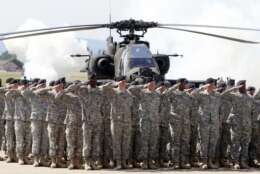Department of Defense
-
The top echelon is aware the U.S. Army has a problem with sexual harassment, sexual abuse, substance-use disorders, and suicide. In fact, since 2019, the Army has produced nearly 50 studies of these problems. But most of those studies do not include specific recommendations for dealing with these problems. That's according to an internal meta study done by the Army Audit Agency, and obtained by POGO: the Project on Government Oversight.
June 21, 2023 -
The Defense Department has been dealing with Chinese planes and ships harassing U.S. planes and ships. The State Department has dealt with Chinese aggression on the diplomatic front.
June 20, 2023 -
The debt ceiling debate has absorbed many in Washington over the past few weeks, as well as those whose business prospects are directly tied to federal spending.
June 06, 2023 -
The self-driving vehicle is now a reachable asset for travelers in major American cities, after a ton of researching and testing. The Army, however, has it own need for the autonomous vehicles.
June 05, 2023 -
The Federal Acquisition Regulation Council is out with a new proposed rule regarding small businesses. Specifically, it would align the FAR with the Small Business Administration, when it comes to Small Business Innovation Research and Small Business Technology Transfer, together known as SBIR and STTR.
May 24, 2023 -
The Biden administration is seeking feedback on how federal agencies could benefit from generative artificial intelligence tools, like ChatGPT, to meet its mission.
May 23, 2023 -
The Defense Department program meant to help service members transition to civilian life needs to improve, and Congress wants more accountability.
May 19, 2023 -
A wearable device developed by DoD’s Defense Innovation Unit uses artificial intelligence to detect signs of COVID and other infections.
May 15, 2023 -
If the U.S. is to prevail in the world's strategic hot spots, the Defense Department will have to adopt some of the strategies China seems to be using successfully.
May 15, 2023 -
In today's episode, Michael Binder interviews Robert Storch, who has been inspector general of the Department of Defense since December 2022.
May 12, 2023 -
A recent Senate Armed Services subcommittee hearing raised questions of integrity and the so-called revolving door between industry and the Defense Department. The Project on Government Oversight (POGO) was among the witnesses, saying there's too much industrial influence on Pentagon decisions coming from former officers and high-level civilians.
May 11, 2023 -
The Tonopah Test Range is a classified spot in Nevada, operated by the Defense and Energy Departments. It was once the site for nuclear materials testing. Many veterans who worked at Tonopah in later years claim exposure to residual radiation has caused health problems.
May 11, 2023 -
Whistleblowers have played a critical role in policy changes at the Veterans Affairs Department over the years, but it comes at a cost for many of them. Some face demotions, workplace hostility, other indignities.
May 10, 2023 -
Over the last several years, Congress has passed several pieces of legislation meant to speed up the Defense Department’s acquisition system. Now, DoD officials have an idea of their own:
May 08, 2023 -
Camp Ripley is a 53,000-acre civilian and military training facility operated by the Minnesota National Guard. Keeping it up and maintaining it is no trivial matter.
May 05, 2023















